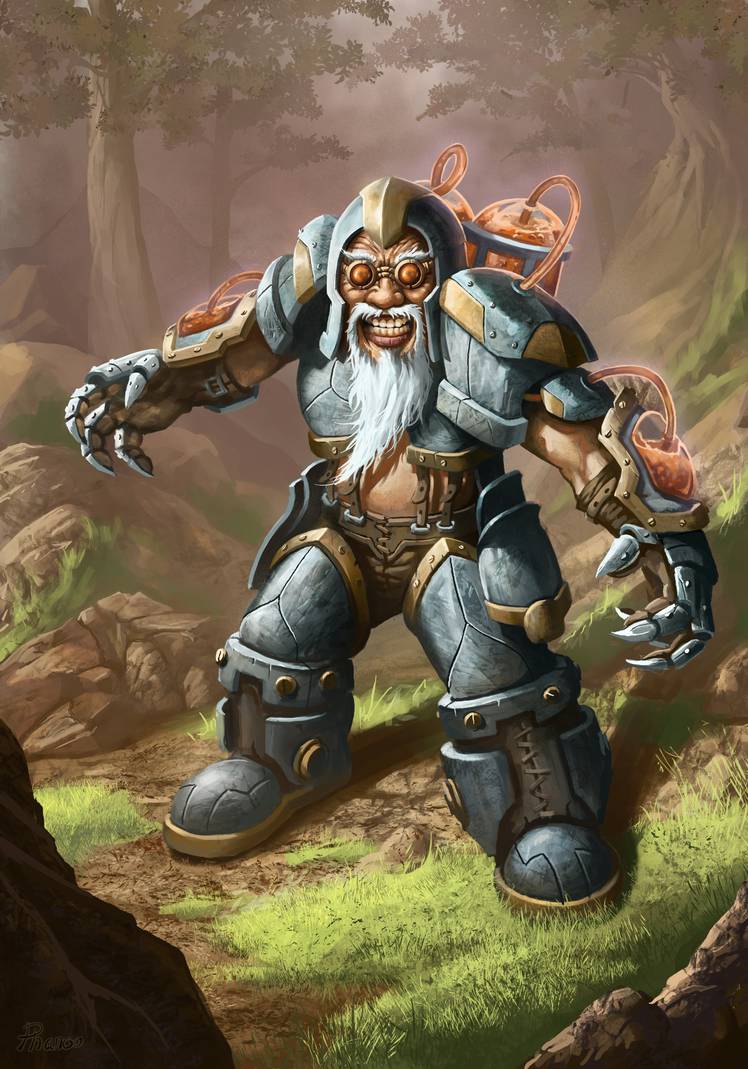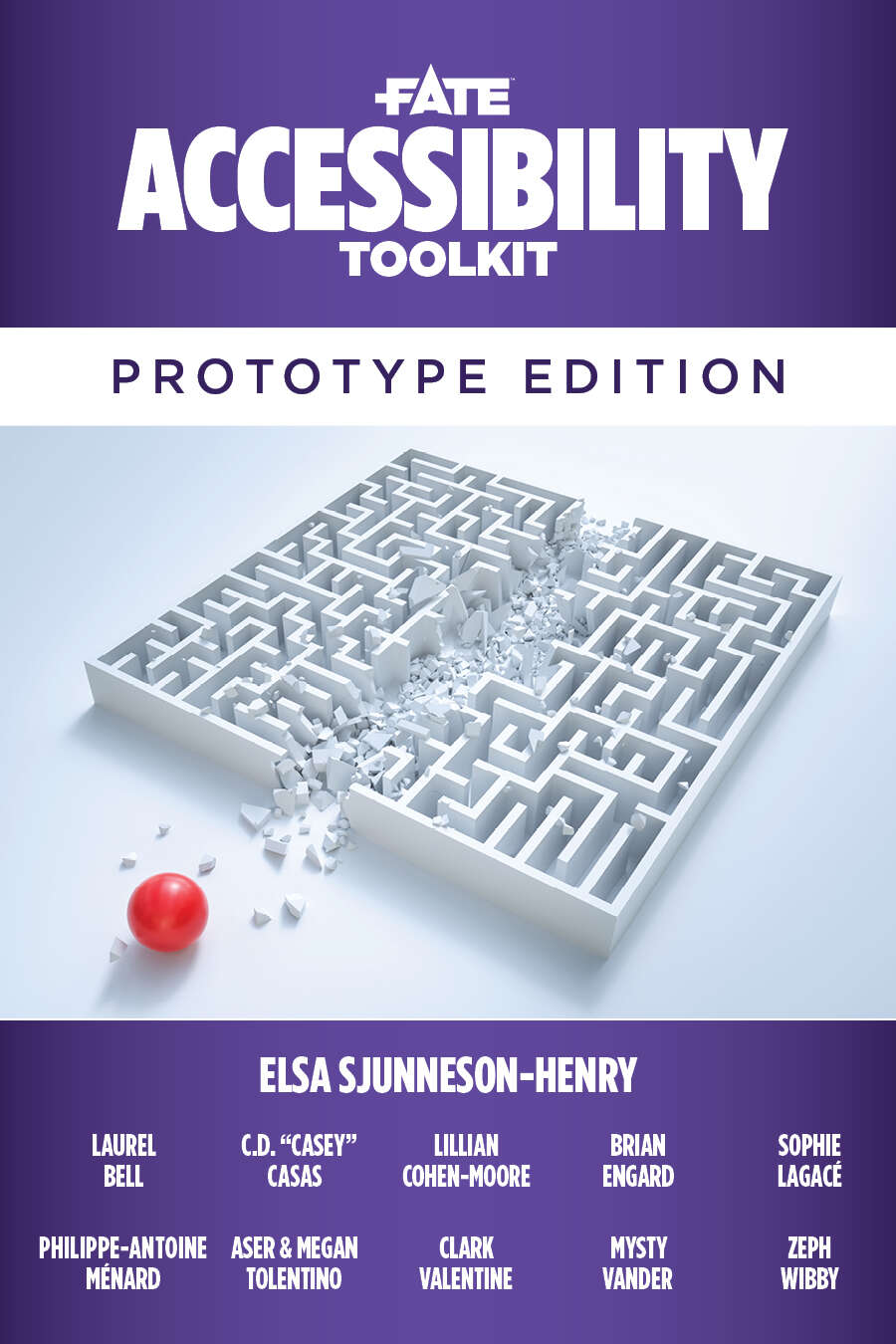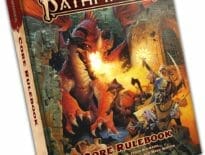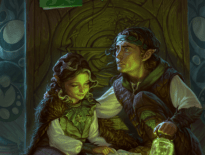I snapped up a copy of Evil Hat Productions’ Fate Accessibility Toolkit: Prototype Edition when it became available at the start of the week. That means I saved a few bucks off the regular price of $10 for 120+ pages of text.
This is an RPG supplement that helps you deal with disabilities.
There’s no art in the Prototype Edition, and I think it’s worth explaining why.
Evil Hat Productions have had it rough. Last year they hit severe financial problems. Too many games did not sell well enough, and they had to let staff go and cut back productions. You may have noticed Evil Hat Kickstarters only ship to the US.
Art is expensive, but the prototype approach allows the company to add in illustrations retrospectively and update the electronic product for free. My copy of Fate Accessibility Toolkit has grey squares in the layout which mark where future art will go if enough people buy the toolkit.
Despite those financial struggles, Evil Hat remained committed to publishing the Fate Accessibility Toolkit, and they deserve credit for that.
The book is written by people with disabilities. The lead author is Elsa Sjunneson-Henry and her Twitter bio says;
Spec Fic & NonFic Writer and Editor. Hugo Finalist. Deafblind guide dog handler. Rabblerouser. she/her.
In this rare case, I think some awareness of the reviewer is also appropriate, as I am also disabled. In fact, my regular tabletop gaming session has no fully-able people in it.
If my regular gaming group had character sheets for our real-life selves, then we would all get points back from disadvantages to spend in other areas and… oh, hold on. This is precisely the sort of RPG design trope that Sjunneson-Henry is railing against with the toolkit. Disabilities don’t need to be treated like that, and the toolkit argues they shouldn’t be.
Did you know?
I don’t always agree with Elsa. Or the many disabled co-authors.
I think it’s okay to say that as one of the takeaway messages you will get from the toolkit is that people are sophisticated and different. We disagree.
There is a big conversation around whether you put the person or the disability first in language, for example. Is it “a blind man” or a “man with blindness”. Why would people know that? Unless it’s important to you, the existence of that debate may never cross your path. Elsa suggests you check with your players in case it is important to one of them. That’s advice I do agree with.
I think the primary purpose of buying the toolkit is to learn. It’s an archive of ideas and observations you may not have considered. It may preach those considerations from time to time, and that’s acknowledged directly by Brian Engard of Evil Hat. He argues that, yes, Fate is supposed to be an RPG where you can say ‘Yes’ to things, but it’s also a respectful game. It’s about having fun, and sometimes that means not bringing a harmful trope to the gaming table.
You don’t, of course, have to buy Fate Accessibility Toolkit.
If you do buy the toolkit then what you’ll get is this; insight into the world of disabilities, excellent considerations for translating disabilities into Fate mechanics (primarily through character builds) and how to be more mindful of disabled people at your gaming table.
The pros and cons

The main drawback I see with the toolkit as a sensible purchase is the fact it’s for Fate. Fate needs less help with disabilities than so many other popular systems. Fate is a good fit for the goal of the toolkit and in a perverse way that makes it less valuable. A blind sleuth in a 1920s game is a more straightforward character to generate than, say, almost any of the D&D character classes. I speak as someone who’s been trying to commission ‘disabled fantasy art’ for several years now. It’s a struggle to make the character concepts work.
For me, the main reason to buy the toolkit is the “Oh, I didn’t know that” discovery of what specific disabilities mean. With that in mind here’s what the download tackles head-on; blindness, D/deaf & hard of hearing, mobility issues, dwarfism, chronic illness, autism, depression & generalised anxiety, schizophrenia, bipolarity and PTSD.
Obviously, they couldn’t cover everything. The standout omission that I can see is ADHD. That’s a common and powerful affliction.
For each of the disabilities that the toolkit does cover you will get a considerate introduction into. This introduction leads to sensible questions to consider for character generation. That flows into Fate mechanics; aspects, stunts, conditions, skills, etc.
Wheelchairs are vehicles. You’ll get that message.
There’s also practical help in the toolkit. There’s a Fate character sheet that someone who struggles to read small text will have a chance with. There are script changing cards (rewind, fast forward and pause) if you want to adopt that system – and its one that the toolkit tells you about.
I want to wrap up the review by sharing a list of things you (like I) may not have considered. It appears on page 9 of the toolkit, just below a grey square which might contain art one day.

A Short List of Things You May Not Have Considered
- Disabled people ‘don’t always want to be cured.
- Not all disabilities have a cure.
- The Disability Binary is a lie. Most disabilities exist on a sliding scale. Not all blind people are totally blind, not all D/deaf people are totally D/deaf, a person in a wheelchair may be able to stand and walk short distances.
- An adaptive device is a tool, sometimes an extension of or replacement for a body part. It is not a toy or a prop or a thing to be mocked.
- Disability can be part of your identity, but it ‘isn’t all of you either. Disabled people are Jewish, PoC, gay, straight, trans… Disabled people are just that. Complex people.
- Pain is relative. Some kinds of pain ‘don’t even rate for someone who has it all the time.
- Disability is not one size fits all; it looks different on everyone, and everyone who has a disability handles their own differently. Even people with the same disability ‘don’t all handle it in the exact same way.
- Not all disabilities are visible. You might play a character with an invisible disability—their experience is still a disabled one.
Overall
If your lip curls into a snarl at the very idea of there being a Fate Accessibility Toolkit then don’t buy it. Evil Hat has published it as safely as they can, and its existence has had zero opportunity cost to you.
If you’re intrigued, then I think you’ll appreciate the 120+ pages of insight and observation.
I think most Fate players will get ideas for cool characters from this toolkit. I believe the download will enable you to persuade your GM to let you play the character too. The character ideas here might be framed with Fate, but they will work with almost any modern game. I think it’ll be harder for heroic fantasy, but possible. After all, Elsa had a deaf 7th Sea character who was more than able to beat sharks in the face.
Creative Commons credit: by Clapiart and Gnome Stimultant by Stéphane Ducher.
Do you think Evil Hat Productions are right to have backed the book through their financial hardship and published it in prototype form?



I have a copy of the Accessibility Toolkit and have suggested it, not just to the other Fate players that I know, but to gamers in general. Having a fosterling who is on the spectrum, and a couple of friends with disabilities that enjoy gaming made this book a joy to own (and they are doing their own reviews for me).